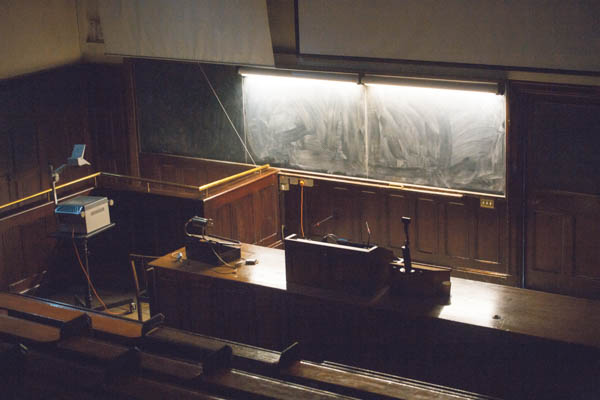Five Nobel laureates and the brightest minds in biological science will come together this week to speak at Trinity’s landmark Schrodinger at 75 conference.
Schrodinger at 75 – the Future of Biology will take place on September 5th and 6th and will celebrate the 75th anniversary of prominent scientist Erwin Schrodinger’s 1943 “What is Life?” lecture, in which he spoke of an “aperiodic crystal” to describe how genes are made.
The two-day conference will see 20 speakers give their take on the salient issues in biology and what lies ahead for biological scientists. The topics of discussion include the basis of the mind and consciousness, ageing, gene editing, synthetic biology, bioenergetics and the origin of life.
In addition to the conference, Trinity’s library has curated an exhibition which celebrates Schrodinger and the science collections of the library. The exhibition is being held in the Old Library, and runs until October 31st.
Students have been given the chance to shadow these prominent scientists and to present their reflections on the talks at a student summit.
Daniel Dennett, the keynote speaker, is a naturalist philosopher and author who specialises in the philosophy of the mind. From 1993, Dennett developed an intelligent, and possibly conscious, robot named Cog in Massachusetts Institute of Technology. He will be speaking on “The Future of Life”.
Ada Yonath will also speak at the conference. Yonath is a protein crystallographer who won the Nobel Prize for Chemistry in 2009 alongside Venkatraman Ramakrishnan and Thomas Steitz.
In a press statement, Yonath said she hopes to “shed light on the physicochemical basis of life, were reported in a course given 75 years ago, during the 2nd World War, yet attracting ~400 listeners”.
Bernard Feringa is a Dutch synthetic organic chemist, specialising in molecular nanotechnology and homogenous catalysis. He was awarded a Nobel Prize in 2016 for the design and synthesis of molecular machines. He will be speaking on the future of chemistry.
John O’Keefe – another Nobel laureate – is a neuroscientist who contributed to the discovery of place cells in the hippocampus of the brain and elucidated their role in cognitive mapping. These discoveries have implications in our understanding of Alzheimer’s disease and other human neurological diseases.
Michael Rosbash is a geneticist and chronobiologist. Rosbash was awarded the Nobel Prize in 2017 with Michael W Young and Jeffrey C Hall for their discoveries of molecular mechanisms controlling the circadian rhythm.
Susumu Tonegawa won the Nobel Prize in 1987 for discovering the genetic mechanism that produces antibody diversity. Using gene manipulation techniques, Tonegawa, who will also speak at the conference, is exploring the molecular, cellular and neural circuit mechanisms of learning and memory.
Emma Teeling is a leader in the fields of mammalian phylogenetics and comparative genomics. Since establishing her research group at UCD in 2005, she has been awarded a European Research Council starting grant. A number of her publications have overturned conventional paradigms in mammalian biology.
Philip Campbell is a former Editor of Springer Nature. He is responsible for creating a prize to recognise excellence in scientific mentoring in different countries. In 2016 he was knighted for his services to science.
Prof Lydia Lynch is the only Trinity academic speaking at the conference. Lynch received a Newman Fellowship for her postdoctoral studies in St Vincent’s University Hospital, where she established the immunology and obesity lab.
Karl Deisseroth, Michael Gazzaniga, Kathryn Holt, Leroy Hood, Christof Koch and Saul Kato will also speak at the conference.
Correction: 01:16, September 1st, 2018
An earlier version of this article stated that Linda Buck would be speaking at the conference. In fact, Buck is no longer speaking.







